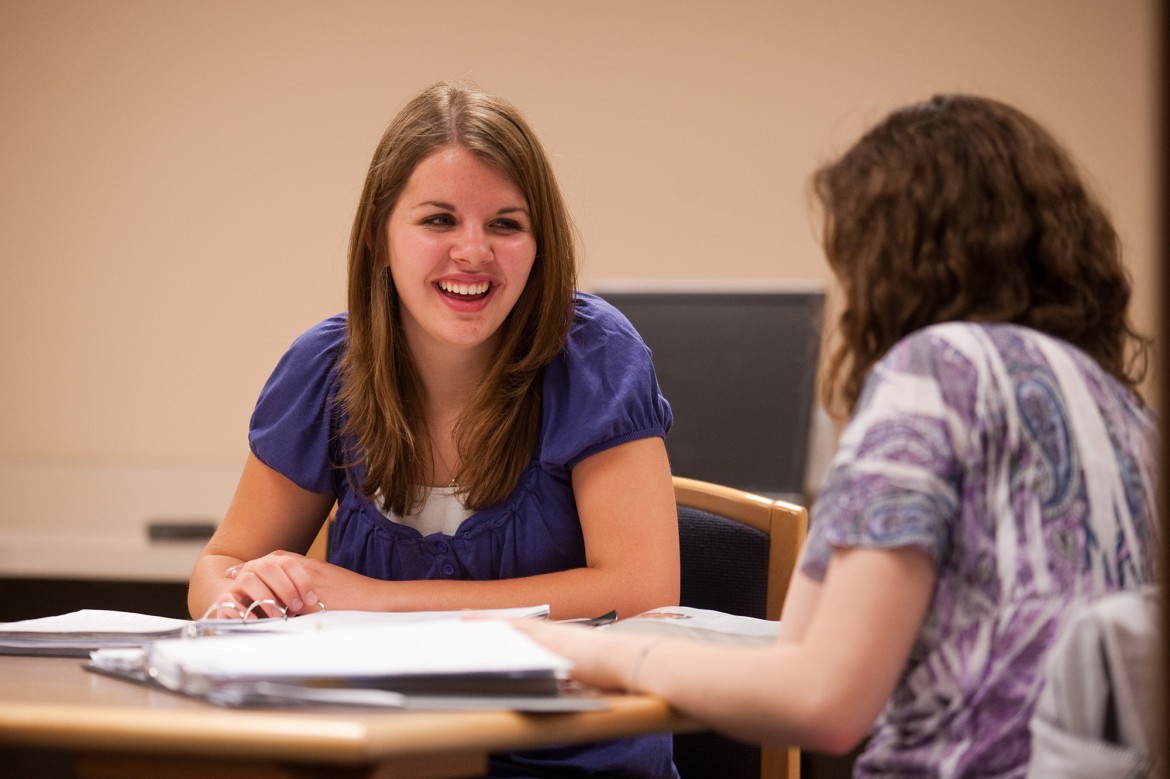They come to Hesston College from across the country and around the world. They come from different backgrounds and religions, bringing a mosaic of ideas. They come to study nursing, business and social work, to play soccer or sing in the choir.
Regardless of how or why they end up on campus, Hesston College students are all offered the opportunity for success.
A network of academic support services are available to students across the spectrum. These services extend beyond basic classroom interactions and include peer tutoring, enhanced advising, writing assistants and an entire lab focused on student success.
Enter Rosie (Beachey) ’72 Jantz and Deb (Swartzendruber) ’83 Roth. Jantz and Roth work in Student Success, which includes organizing and operating several free student support services through the ACCESS lab (Academic Center for Career Exploration and Student Success).
“Our goal is to help students become independent learners,” said Roth. “We don’t want to spoon feed them so they can do just enough to get by. We help them identify their learning preferences and find the most effective tools to accommodate them.” While one function of ACCESS is to provide accommodations for students with learning disabilities, it also offers a wide range of tutoring arrangements in a friendly and welcoming atmosphere.
“We try to be intentional about marketing ACCESS for everyone,” said Jantz.

Some faculty spend their office hours in ACCESS so they are easily accessible to students seeking help. Students work as peer tutors, offering one-on-one assistance, drop-in assistance and group study sessions for specific departments or classes. Academic mentors are students who act as role models for good study habits for peers who may need help with focus, organization or time management.
Jodi Ferguson ’11 of Kalona, Iowa, a recent graduate of the Early Childhood Education program, used the lab for a variety of services.
“It was nice to have people available to talk about classes with,” she said. “I learn best with other people, so when I would have a large chunk of reading for class, I could talk about it with my tutor, which helped me process what I had just read.”
The peer-tutor interactions serve as a mutually beneficial arrangement for both the tutee and the tutor.
Erika Dorsch ’13, a three-year nursing student from Whitewater, Kan., was doing well in her Anatomy and Physiology class during the fall semester when she was asked to help tutor other students. Dorsch did so well in the unexpected role that she tutored the following semester, too.
“Explaining concepts and terms to other students helps me to understand them better,” said Dorsch. “It also keeps me accountable in making sure I understand the material.”
Student tutors have to stay a step or two ahead of their classmates to be prepared to assist them. Many of the 27 spring semester student tutors prepared for their tutoring sessions by making study guides, handouts or other supplemental instructional aids to support tutees.
Tutees know tutors provide a place to privately and safely address their academic challenges without shame or judgment.
“Using a tutor is not taboo here,” said Ferguson. “Everyone has the same opportunities through ACCESS, so it never feels judgmental.”
Over the last few years, the college has put even more student services in place. English faculty Dr. Karen Sheriff LeVan started the Writing Fellows Program in 2009. Writing Fellows are a select group of sophomores who work as writing tutors for specific professors or classes to facilitate drafting and revision processes for students.
“The Writing Fellows program was developed to encourage students to take their writing more seriously, improve their communication skills and have the opportunity to participate in collaborative peer learning,” said LeVan. “Students who utilize writing assistants are accountable for their writing in a drafted form much earlier and may spend more time on revision.”
Faculty advising was also given a fresh twist this year as the college moved from the advisor serving as a course selection agent to becoming more connected with individual advisees. First-year students are required to meet with their advisor weekly for the first eight weeks of the academic year.
“Advising is a margin of difference for us,” said Roth. “Each advisor only has 20 to 24 advisees, so he or she is able to invest more and build relationships with the students. Studies show that students who connect with a faculty member are more engaged with the institution and learning.”
From semester to semester and from year to year, Roth and Jantz see results from the students who take advantage of the learning opportunities offered them, and the students are grateful for their efforts.
“Hesston is a place of discovery,” said Ferguson. “It’s important to learn how you are best at learning, and if you can’t do that here, where can you do it?”


